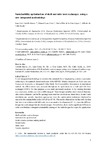Sustainability Optimisation of Shell and Tube Heat Exchanger, Using a New Integrated Methodology

View/
Use this link to cite
http://hdl.handle.net/2183/40302
Except where otherwise noted, this item's license is described as Attribution-NonCommercial-NoDerivatives 4.0 International https://creativecommons.org/licenses/by-nc-nd/4.0/
Collections
- Investigación (EPEF) [590]
Metadata
Show full item recordTitle
Sustainability Optimisation of Shell and Tube Heat Exchanger, Using a New Integrated MethodologyDate
2018-11-01Citation
Cartelle Barros, J.J., Lara Coira, M., De La Cruz López, M.P., Del Caño Gochi, A., 2018. Sustainability optimisation of shell and tube heat exchanger, using a new integrated methodology. Journal of Cleaner Production 200, 552–567. https://doi.org/10.1016/j.jclepro.2018.07.266
Abstract
[Abstract] A new integrated methodology to optimise the sustainability of engineering systems is presented in this study. It is partially based on the use of the MIVES (Modelo Integrado de Valor para una Evaluación Sostenible, or Integrated Value Model for Sustainability Assessment, in translation) method. Its effectiveness was assessed throughout its application to a shell and tube heat exchanger (STHE). For that purpose, a case study previously analysed in the existing literature was considered, in this case with a different goal. Three design variables (shell internal diameter, tube outside diameter and baffle spacing) were used for optimisation. Brute force, Monte Carlo simulation and genetic algorithm approaches were the optimisation techniques deployed to maximise the sustainability index (SI) of the STHE. The results obtained are in line with the idea that there is no solution with full-scale, strict sustainable development (SI = 1), since the different designs have advantages but also disadvantages. Nevertheless, there can be significant differences in the contribution to integral sustainability among all the valid designs for a specific application.
Keywords
Shell and tube heat exchanger
Sustainability optimisation
Multi-criteria decision making method
Monte Carlo
Brute force
Genetic algorithm
Sustainability optimisation
Multi-criteria decision making method
Monte Carlo
Brute force
Genetic algorithm
Description
Manuscrito aceptado
Editor version
Rights
Attribution-NonCommercial-NoDerivatives 4.0 International https://creativecommons.org/licenses/by-nc-nd/4.0/
ISSN
1879-1786






